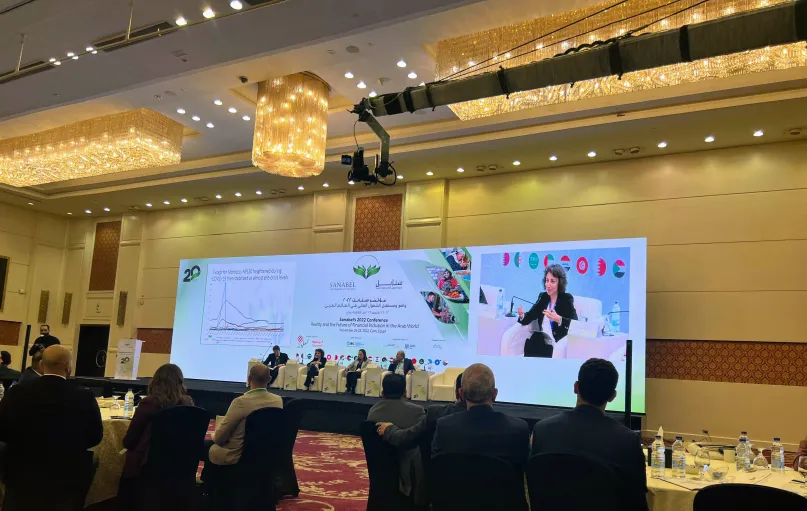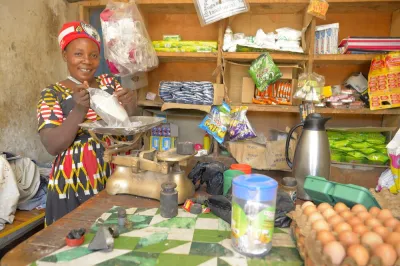Microfinance in the Arab World: Growing, Evolving and Building Resilience

After three years of pandemic-imposed interruption, more than 300 financial inclusion professionals from across the Arab world reconvened in Cairo from 21 to 23 November to attend the Sanabel Annual Conference.
Hosted by the the Sanabel Microfinance Network for Arab Countries, the event brought together financial inclusion practitioners, regulators, researchers, donors, international organizations, civil society and entrepreneurs to discuss the latest issues in the sector and share experiences and lessons learned. This year’s conference also marked the 20th anniversary since the founding of the network.
FinDev Gateway teamed up with the our long-term partner, the Sanabel Network, to bring you some of the key takeaways from the conference:
- The microfinance sector in the Arab world continues to grow and evolve, with commercialization of microfinance institutions (MFIs) driving growth. Presentations at the conference showed that MFIs today reach an estimated 6 million borrowers, up from only 2.3 million in 2011. Egypt and Tunisia are leading the regional growth, with Egypt making up about 60 percent of the total number of microfinance clients in the region. Regulations in these two countries have enabled the growth by allowing small non-profit MFIs to transform into commercial entities as well as opening the opportunity for new providers to enter the market. Regulators in other countries can draw lessons from experiences in Egypt and Tunisia to support the microfinance sector. This is important given that MFIs in the region account for the majority of formal borrowing among low-income people, yet, there is still a substantial demand that is not being met. In addition, there is an estimated $185 billion financing gap for micro, small and medium-sized enterprises (MSMEs) in the Arab world.
- COVID-19 is not over for customers. Many businesses in the region have not recovered from the pandemic, and employment has not fully resumed. The impact of COVID-19 continues to be felt among individuals and small businesses. The microfinance sector can play an important role in driving recovery.
- Green microfinance strategies can play an important role in helping clients build resilience. Many countries in the region face limited access to energy and water, posing a challenge for both MFIs and their clients. For example, limited energy supplies often disrupt microfinance operations. A new report by Sanad, in partnership with Hedera, launched at the conference, identifies challenges and opportunities for green inclusive microfinance in the Arab world and documents actions already taken by some MFIs in the region towards adopting green approaches.
- Regulators should focus on building resilient institutions and sectors. The COVID-19 pandemic, national conflict and inflation have reinforced the need to focus on building the resilience of microfinance clients and MFIs. For MFIs facing domestic financial crises, like those in Lebanon and Yemen, a key factor determining how well they weathered the crisis was whether they could hold deposits abroad or not. In addition, when regulation allows MFIs to diversify their product offering, it enables them to manage risks better and helps build institutional resilience in times of crises.
- The Sanabel Network is looking forward to a refreshed sense of mission to serve the needs of an evolving microfinance sector in the region. For over two decades, Sanabel has served as an important convener for the microfinance sector in the Arab world. There is an increased opportunity for the Sanabel Network to grow and lead a dynamic sector that can responsibly serve millions of customers who remain excluded from the formal financial system.
For more, watch what some of the participants had to say in these brief video interviews.
FinDev Blog
About this post
Edy Semaan is the Editor for the Arabic FinDev Gateway at CGAP. Valdete Berisha is Senior External Affairs Officer at CGAP, where she manages the overall FinDev Gateway.
Published
Contributed by a global financial inclusion community member. Share your lessons learned
Write for usLeave a Comment
Comments on this page are moderated by FinDev Editors. We welcome comments that offer remarks and insights that are relevant to the post. Learn More


